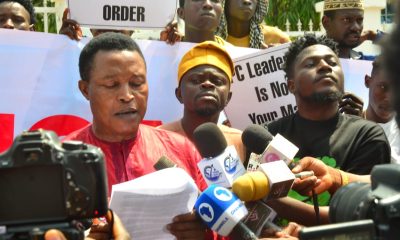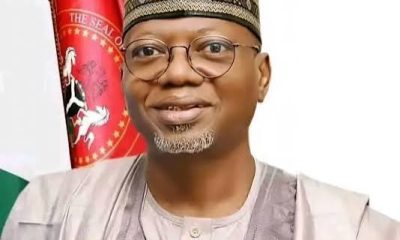News
Towards Equal Access: Addressing Educational Challenges for Students with Disabilities

The call for inclusive education in Nigeria is gaining traction, as the global community continues to advocate for equal access to quality education for all. This push aligns with Sustainable Development Goal 4 (SDG 4), which aims to ensure inclusive and equitable quality education and promote lifelong learning opportunities. One of the core objectives of SDG 4 is to increase the proportion of schools with adapted infrastructure and materials to support students with disabilities.
In Nigeria, inclusive education refers to the process of addressing barriers and providing equal access to quality education to meet the diverse needs of all learners within the same learning environment. Despite this, Nigeria is still grappling with one of the most unequal education systems globally, with children with disabilities being among the most disadvantaged. Very few children with disabilities are enrolled in schools.
The challenges to achieving inclusive education in Nigeria are manifold. Limited educational opportunities, poverty, armed conflict, and stark inequalities between rural and urban areas are key obstacles. Although some states have established special schools to support children with disabilities, the current shift in policy towards access to universal education has exposed a significant problem. Experts agree that inclusive mainstream schools equipped with specialized teaching staff represent best practices, rather than isolating students in special needs schools.
The Disability Act in Nigeria provides a legal framework to address these issues. It guarantees free education for persons with disabilities up to the secondary level, and mandates that public schools at all levels be inclusive and accessible. Schools are required to have trained personnel and special facilities, such as braille and sign language resources, to support students with disabilities. However, in practice, many schools lack the necessary trained staff and facilities, with some even refusing to enroll children with disabilities.
Laban Onisimus, Head of Social Development Programmes at Plan International Nigeria, emphasized the importance of inclusive education, which he defines as an educational system where all students, regardless of their challenges, learn together in the same environment. He highlighted the first challenge as the misinterpretation of inclusive education in Nigeria, which is often confused with special education. According to him, getting the definition wrong from the outset leads to misguided attempts at inclusive education.
Onisimus shared his experience in Ethiopia, where he attended a truly inclusive school where students of all abilities learned under one roof. He noted that this requires teachers who are well-versed in various teaching methods, including braille for the visually impaired, sign language, and other specialized teaching techniques. He stressed that Nigeria must first, correct its definition of inclusive education to ensure effective planning for infrastructure, teachers and learning materials.
Efforts to address these challenges have seen some progress. Plan International has rehabilitated model schools in the North-East, making them more accessible to children with disabilities by providing ramps and accessible toilets. However, Onisimus cautions that infrastructure is only one part of the solution, highlighting the need to invest in the “software” of inclusive education—such as teacher training.
Michael Sule, an educationist, argued that Nigeria still has a long way to go in achieving inclusive education. The country faces significant challenges, including a high number of out-of-school children, dropout rates, insecurity, and lack of facilities to support students with special needs. He noted that societal stigma, parental attitude, poverty, and inadequate schools within communities further exacerbate these challenges.
In response to these issues, the Joint Admissions and Matriculation Board (JAMB) has taken steps to promote inclusive education in higher institutions.
According to its Registrar, Prof. Ishaq Oloyede, education is the key to self-actualization, and every individual, regardless of their abilities, should have access to higher education. JAMB has reduced registration fees for candidates with disabilities and offers special accommodation for visually impaired students and those with other disabilities during the examination process.
The board has also established 11 adapted centers across Nigeria and created the Disability Support Unit in JAMB and tertiary institutions. These initiatives aim to promote the study of Disability Support Services and increase awareness of the needs of students with disabilities.
Prof. Oloyede also suggested adopting Nigerian Sign Language (NSL) as the second national official language to demonstrate empathy for the large population of hearing-impaired Nigerians. He stressed that inclusivity in education is non-negotiable and called for more action to improve access to quality education for persons with disabilities.
Minister of State for Education, Dr. Yusuf Tanko Sununu, echoed these sentiments, emphasizing the need to remove the barriers preventing persons with disabilities from accessing education and economic opportunities.
He highlighted the importance of supporting students with disabilities through scholarships, grants and interest-free loans.
Sununu also revealed plans to enroll 825,000 students with disabilities over the next five years as part of government’s strategy to ensure that every child has the opportunity to reach their full potentials.
In conclusion, while Nigeria has made some progress toward inclusive education, significant challenges remain. There is the need for a clearer definition of inclusive education, better planning for infrastructure and teacher training, and greater societal acceptance of children with disabilities. Only through concerted efforts from all stakeholders will Nigeria be able to achieve a truly inclusive educational system.
News
Why CSOs, APC Leaders Want NASS To Takeover Rivers Assembly Duties

Civil society organisations, media professionals, and leaders of the APC on Friday called for urgent constitutional intervention in the escalating political crisis in Rivers State, demanding that the National Assembly take over the legislative functions of the Rivers State House of Assembly in line with Section 11 of the Constitution.
Addressing journalists during a one week non stop rally at the APC Secretariat on 23rd January 2026, the groups declared that the Rivers State House of Assembly had lost credibility, legitimacy, and public trust due to what they described as persistent abuse of legislative powers and a reckless attempt to impeach Governor Siminalayi Fubara.
They warned that Rivers State was sliding into a dangerous constitutional crisis, stressing that the ongoing impeachment process was no longer about legislative oversight but a deliberate effort to destabilise democratic governance. According to them, democracy in the state was under serious threat and silence at this point would amount to complicity.
The groups commended the Rivers State Chief Judge for refusing to constitute a probe panel and for respecting existing court orders, describing the decision as a clear affirmation of the rule of law and a rejection of illegality. They insisted that no evidence of gross misconduct, as required by the Constitution, had been presented against Governor Fubara, adding that the allegations were unsubstantiated and politically motivated.
They further accused the Rivers State House of Assembly of procedural lawlessness, vendetta politics, and disregard for judicial authority, arguing that such conduct rendered the Assembly incapable of performing its constitutional duties. On this basis, they urged the National Assembly to invoke Section 11 subsection 4 of the Constitution of the Federal Republic of Nigeria and assume the legislative functions of the state assembly to restore order and democratic stability.
The APC Leaders Forum and civil society groups also alleged that 27 lawmakers loyal to former Governor Nyesom Wike, led by Martins Amaewhule, were behind the crisis. They claimed the lawmakers had received constituency project funds estimated at about ₦350 million each, luxury SUV vehicles, and up to one year salary in advance, yet remained unsatisfied and determined to frustrate the current administration. According to the groups, the lawmakers were more interested in diverting state resources for personal benefit than allowing public funds to serve the people of Rivers State.
The coalition vowed to sustain the protests until decisive constitutional action was taken, including the takeover of legislative functions by the National Assembly. They called on Nigerians of goodwill to peacefully mobilise, maintain civic presence around the National Assembly, and resist what they described as legislative anarchy.
They maintained that Governor Fubara had shown prudence and commitment to the welfare of Rivers people, warning that Rivers State must not be sacrificed on the altar of political desperation.
The groups concluded with a call for unity in defence of democracy, declaring their resolve to continue the struggle until constitutional order is fully restored in Rivers State.
News
FG Approves Fresh ₦152bn for Contractors, BAVCCA Defends Finance Minister
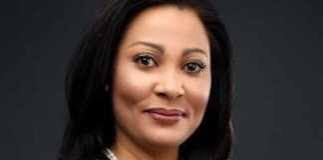
The Bloggers and Vloggers, Content Creators Association in Nigeria (BAVCCA) has revealed that ₦152 billion was paid yesterday to contractors with verified contracts, as part of efforts to resolve a protest that disrupted activities at the Federal Ministry of Finance on Monday, January 19.
The protest, staged by indigenous contractors over outstanding payments for executed contracts, prevented access to the ministry’s premises and briefly blocked Minister of State for Finance, Doris Uzoka Anite, from entering her office.
BAVCCA, in a press conference addressed in Abuja by its National Secretary, Tabuko Kennedy on Thursday, January 22, clarified that the issue predated Anite’s assumption of office and was already being addressed by relevant government structures. The association’s independent panel of enquiry found the contractors’ grievances genuine, with many facing financial difficulties due to delayed payments.
According to BAVCCA, about 80% of verified obligations have been processed and paid, with the balance at various stages of reconciliation and documentation. The Federal Government has agreed to convene roundtable discussions with contractor representatives to harmonize records and expedite outstanding payments.
BAVCCA commended Anite’s commitment to resolving the issue, emphasizing that she had appealed for patience and requested time to understand the issues. The association urged contractors to pursue grievances through lawful and structured engagement, while calling on the media to report responsibly and avoid inflammatory narratives.
The incident has highlighted systemic administrative challenges, rather than personal failure or negligence by the Minister of State for Finance, BAVCCA noted.
The association urged, “the Federal Government to conclude outstanding verified payments.
“Contractors to embrace dialogue and documentation driven resolution.
“The media to report responsibly and avoid inflammatory narratives.
“Constructive engagement, transparency, and respect for institutions remain the best path forward.
PART OF THE STATEMENT READS
It is important to state that Doris Uzoka Anite has held the office of Minister of State for Finance for less than one month at the time of this incident. Our findings confirm that the contractors’ protest predated her assumption of office and was already being handled under the supervision of the Coordinating Minister and relevant government structures. Personalising the issue against her was therefore unfair and misleading.
Upon assuming office, the Minister appealed to contractors for patience, requested time to fully understand the issues, and committed to working with all relevant institutions to achieve a sustainable resolution, demonstrating good faith and empathy.
BAVCCA Panel of Enquiry
BAVCCA constituted an independent Panel of Enquiry comprising experienced content creators, investigative journalists, civil society observers, and policy analysts. The panel engaged contractors, Ministry officials, and independent observers to establish facts and assess responsibility.
Our Findings
The grievances of contractors are genuine. Many have executed verified projects and are experiencing financial difficulties due to delayed payments.
Status of Payments
Payments have commenced and are ongoing. Several contractors confirmed receipt of payments or partial settlements. The Federal Government has stated that about 80 percent of verified obligations have been processed and paid, with the balance at various stages of reconciliation and documentation. We urge completion of the remaining verified payments.
Dialogue and Resolution
Engagements between contractor representatives and government officials have resulted in an agreement to convene round table discussions to harmonise records and expedite outstanding payments.
Ministerial Responsibility
Our findings confirm that the Minister of State for Finance does not unilaterally control payment execution, which involves multiple agencies and statutory processes. We found no evidence of bad faith, obstruction, or personal misconduct by the Minister.
Rule of Law and Conduct
While protest is a democratic right, blocking public offices and preventing officials from performing their duties undermines governance and public safety. Grievances must be pursued through lawful and structured engagement, the statement concludes.
News
Alleged N4tr debts: 1,000 CSOs back local contractors protest against FG
***demand resignation of Finance Minister, Uzoka-Anite
No fewer than one thousand (1000) Civil Society Organizations (CSOs) have formed a strong Coalition to back the ongoing protest against the Federal Government, by Nigeria’s local contractors in Abuja.
The Coalition has also called on the Minister of State for Finance, Dr. Doris Uzoka-Anite, to resign quietly, to save Nigeria of the imminent economic crisis.
This was contained in a statement jointly signed on Wednesday by the Representative of National Vanguard for Accountable and Transparent Democracy (NVATD), Comrade Wisdom Abah; that of Nigerian Young Professionals Forum (NYPF), Engr. Istifanus Pam; Movement for Accountable and Good Governance (MAGGo), Comrade Babatunde Ibidapo; National Coalition for Peace, Unity and Progress (NCPUP), Alhaji Babale Idris; and that of National Forum of APC Young Professionals (NFAYP), Engr. Lukman Adejobi; on behalf of other groups.
The groups frowned at the refusal of the Finance Minister to implement the directive of President Bola Ahmed Tinubu on the outright payment of the outstanding debts owed the indigenous contractors in Nigeria.
They tagged it as a major sign of “economic sabotage”, ascribing the ongoing protest to “unwarranted negligence” of Dr. Uzoka-Anite, saying the ongoing civil action would hamper and ground the nation’s economy.
“We have been sounding this warning, calling and begging the Honourable Minister of State for Finance. This was what we were trying to avoid. But today, it is coming upon the nation. This whole thing was avoidable, but for the unwarranted negligence of the Minister, this is happening”, the statement said.
The Coalition, while acknowledging “the patience, long suffering, perseverance, and display of patriotism” by the Contractors whom they said, have endured the “shame and suffering since 2024”; also called on President Tinubu to urgently constitute another Presidential Committee to take over the responsibility of payment of the debts from the Finance Minister and her team.
“We have understudied this whole issue and we can comfortably tell anyone, including Mr. President, that this is a dangerous signal for economic sabotage. Dr. Uzoka-Anite and her collaborators should not be allowed to handle this issue anymore. It would do this country more harm than good. Infact, the Minister should quietly resign and abdicate her duties, to save the country from the looming economic crisis.
“If not for sabotage, why on earth should you allow the Federal Government to accumulate such a high debt of over four trillion naira (N4tr) since 2024, on projects that have been completed and even Commissioned by the executive. Her own case is even worse than Mr. Wale Edun. She is said to be selecting those contractors from her state of birth or those close to her contacts and paying them.
“Dr Doris Uzoka-Anite promised that warrants would be released once the list of eligible contractors was provided. The Contractors have since submitted the list of eligible recipients and it has been duly confirmed. Yet, no payment has followed the submission, aside some handful selective payments.
“Some of these local contractors have died as a result of pressure from banks where they took loans from, to execute the jobs. Some companies are now rendered bankrupt, while some business owners are down with stroke. Yet, the government is engaging in selective payment to their cronies and foreign contractors.
“Despite the intervention of the Deputy Speaker, House of Representatives, Benjamin Kalu, and the directive from President Tinubu in December that all debts should be cleared, these guys appear adamant. And it is not as if there is no fund. This is total sabotage and the end result is disastrous”, the Coalition warned.
The News Agency of Nigeria (NAN), had reported that, the All Indigenous Contractors Association of Nigeria (AICAN) on Monday resumed its protest in Abuja over N4 trillion debt owed to its members by the Federal Government for completed capital projects appropriated in the 2024 budget.
Speaking with journalists during the protest at the Ministry of Finance on Monday, AICAN President, Mr Jackson Nwosu, warned that the association might be forced to take drastic action if the outstanding payments were not settled.
Nwosu said the funds used to execute the 2024 capital projects were largely sourced from commercial banks, placing contractors under severe financial pressure; threatening to totally shut down the economy of the country, as “our next line of action”, “if they do not kill us”
NAN quoted Nwosu as saying, many contractors had defaulted on bank loans, leading to the seizure of properties, while some members had reportedly died as a result of the financial strain.
-

 Uncategorized3 months ago
Uncategorized3 months agoParacetamol Use in Pregnancy Doesn’t Cause Autism, New Study Confirms
-

 News2 months ago
News2 months agoBreaking: FBNQUEST: Nestoil and Neconde are not under any receivership
-
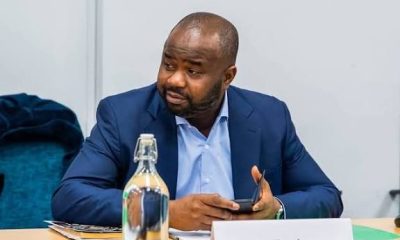
 News3 months ago
News3 months agoCoalition Backtracks, Apologises To FIRS Chairman Adedeji Over False Allegations
-
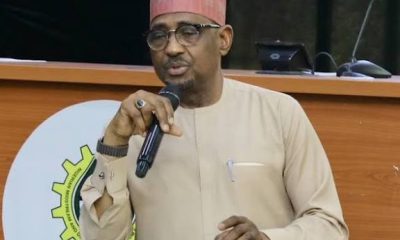
 News2 months ago
News2 months agoCoalition Announces Nationwide and Global Protests Demanding Immediate Removal of NMDPRA CEO Farouk Ahmed
-
News3 months ago
NGO Empowers 150 Girls with Disabilities in FCT to Promote Inclusive Education
-
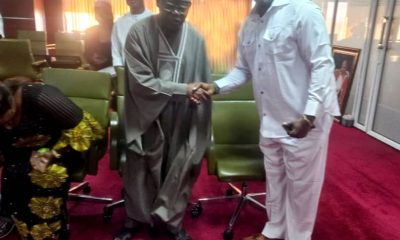
 News3 months ago
News3 months agoFCT Chief Judge Backs BAVCCA’s Call for Responsible Digital Media, Agrees to Co-Host National Conference
-
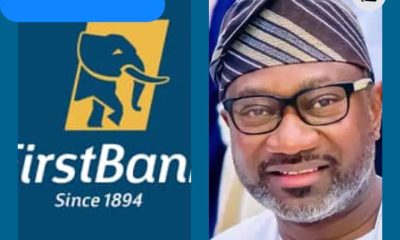
 News2 months ago
News2 months agoExposed: Mr Femi Otedola, accused of Aggressive Banking Gangsterism
-
Uncategorized2 months ago
NUPRC’s Digital Compliance Systems, Licensing Reforms Positioning Nigeria for Stronger Energy Investment, says BusinessMetrics

